Wei Qi
A Dual-TransUNet Deep Learning Framework for Multi-Source Precipitation Merging and Improving Seasonal and Extreme Estimates
Feb 04, 2026Abstract:Multi-source precipitation products (MSPs) from satellite retrievals and reanalysis are widely used for hydroclimatic monitoring, yet spatially heterogeneous biases and limited skill for extremes still constrain their hydrologic utility. Here we develop a dual-stage TransUNet-based multi-source precipitation merging framework (DDL-MSPMF) that integrates six MSPs with four ERA5 near-surface physical predictors. A first-stage classifier estimates daily precipitation occurrence probability, and a second-stage regressor fuses the classifier outputs together with all predictors to estimate daily precipitation amount at 0.25 degree resolution over China for 2001-2020. Benchmarking against multiple deep learning and hybrid baselines shows that the TransUNet - TransUNet configuration yields the best seasonal performance (R = 0.75; RMSE = 2.70 mm/day) and improves robustness relative to a single-regressor setting. For heavy precipitation (>25 mm/day), DDL-MSPMF increases equitable threat scores across most regions of eastern China and better reproduces the spatial pattern of the July 2021 Zhengzhou rainstorm, indicating enhanced extreme-event detection beyond seasonal-mean corrections. Independent evaluation over the Qinghai-Tibet Plateau using TPHiPr further supports its applicability in data-scarce regions. SHAP analysis highlights the importance of precipitation occurrence probabilities and surface pressure, providing physically interpretable diagnostics. The proposed framework offers a scalable and explainable approach for precipitation fusion and extreme-event assessment.
ORPR: An OR-Guided Pretrain-then-Reinforce Learning Model for Inventory Management
Dec 22, 2025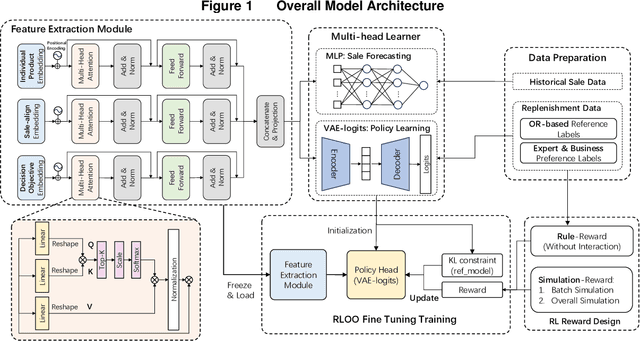
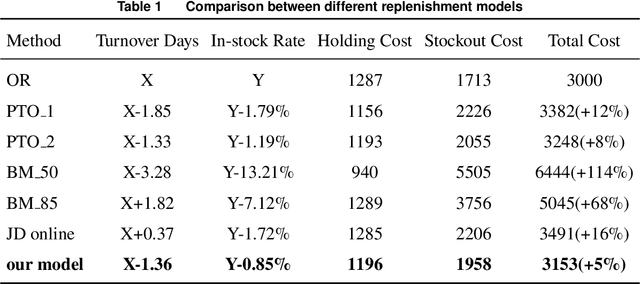
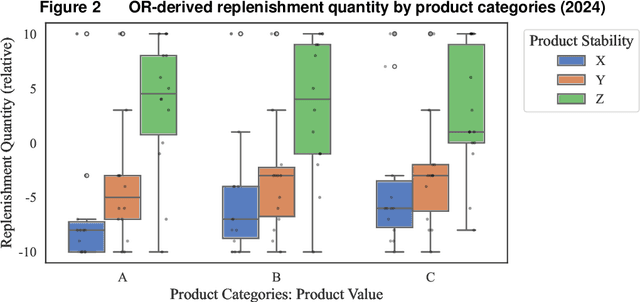

Abstract:As the pursuit of synergy between Artificial Intelligence (AI) and Operations Research (OR) gains momentum in handling complex inventory systems, a critical challenge persists: how to effectively reconcile AI's adaptive perception with OR's structural rigor. To bridge this gap, we propose a novel OR-Guided "Pretrain-then-Reinforce" framework. To provide structured guidance, we propose a simulation-augmented OR model that generates high-quality reference decisions, implicitly capturing complex business constraints and managerial preferences. Leveraging these OR-derived decisions as foundational training labels, we design a domain-informed deep learning foundation model to establish foundational decision-making capabilities, followed by a reinforcement learning (RL) fine-tuning stage. Uniquely, we position RL as a deep alignment mechanism that enables the AI agent to internalize the optimality principles of OR, while simultaneously leveraging exploration for general policy refinement and allowing expert guidance for scenario-specific adaptation (e.g., promotional events). Validated through extensive numerical experiments and a field deployment at JD.com augmented by a Difference-in-Differences (DiD) analysis, our model significantly outperforms incumbent industrial practices, delivering real-world gains of a 5.27-day reduction in turnover and a 2.29% increase in in-stock rates, alongside a 29.95% decrease in holding costs. Contrary to the prevailing trend of brute-force model scaling, our study demonstrates that a lightweight, domain-informed model can deliver state-of-the-art performance and robust transferability when guided by structured OR logic. This approach offers a scalable and cost-effective paradigm for intelligent supply chain management, highlighting the value of deeply aligning AI with OR.
Learn to Relax with Large Language Models: Solving Nonlinear Combinatorial Optimization Problems via Bidirectional Coevolution
Sep 16, 2025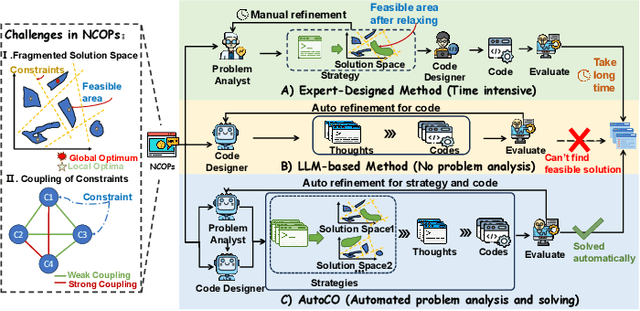



Abstract:Nonlinear Combinatorial Optimization Problems (NCOPs) present a formidable computational hurdle in practice, as their nonconvex nature gives rise to multi-modal solution spaces that defy efficient optimization. Traditional constraint relaxation approaches rely heavily on expert-driven, iterative design processes that lack systematic automation and scalable adaptability. While recent Large Language Model (LLM)-based optimization methods show promise for autonomous problem-solving, they predominantly function as passive constraint validators rather than proactive strategy architects, failing to handle the sophisticated constraint interactions inherent to NCOPs.To address these limitations, we introduce the first end-to-end \textbf{Auto}mated \textbf{C}onstraint \textbf{O}ptimization (AutoCO) method, which revolutionizes NCOPs resolution through learning to relax with LLMs.Specifically, we leverage structured LLM reasoning to generate constraint relaxation strategies, which are dynamically evolving with algorithmic principles and executable code through a unified triple-representation scheme. We further establish a novel bidirectional (global-local) coevolution mechanism that synergistically integrates Evolutionary Algorithms for intensive local refinement with Monte Carlo Tree Search for systematic global strategy space exploration, ensuring optimal balance between intensification and diversification in fragmented solution spaces. Finally, comprehensive experiments on three challenging NCOP benchmarks validate AutoCO's consistent effectiveness and superior performance over the baselines.
Leveraging LLM-Based Agents for Intelligent Supply Chain Planning
Sep 04, 2025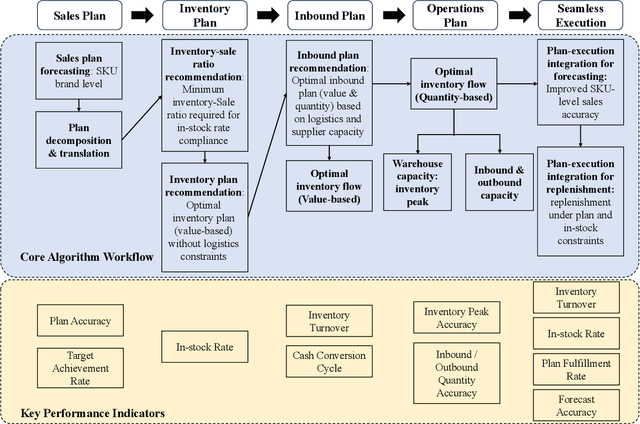
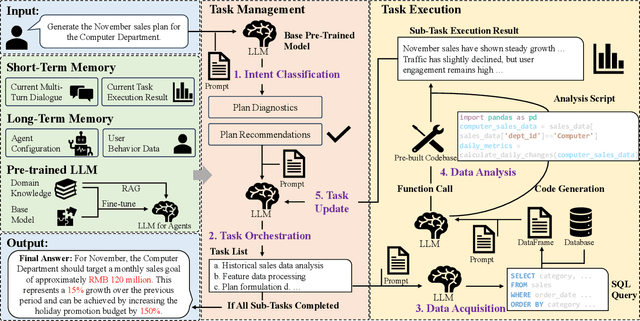
Abstract:In supply chain management, planning is a critical concept. The movement of physical products across different categories, from suppliers to warehouse management, to sales, and logistics transporting them to customers, entails the involvement of many entities. It covers various aspects such as demand forecasting, inventory management, sales operations, and replenishment. How to collect relevant data from an e-commerce platform's perspective, formulate long-term plans, and dynamically adjust them based on environmental changes, while ensuring interpretability, efficiency, and reliability, is a practical and challenging problem. In recent years, the development of AI technologies, especially the rapid progress of large language models, has provided new tools to address real-world issues. In this work, we construct a Supply Chain Planning Agent (SCPA) framework that can understand domain knowledge, comprehend the operator's needs, decompose tasks, leverage or create new tools, and return evidence-based planning reports. We deploy this framework in JD.com's real-world scenario, demonstrating the feasibility of LLM-agent applications in the supply chain. It effectively reduced labor and improved accuracy, stock availability, and other key metrics.
sTransformer: A Modular Approach for Extracting Inter-Sequential and Temporal Information for Time-Series Forecasting
Aug 19, 2024Abstract:In recent years, numerous Transformer-based models have been applied to long-term time-series forecasting (LTSF) tasks. However, recent studies with linear models have questioned their effectiveness, demonstrating that simple linear layers can outperform sophisticated Transformer-based models. In this work, we review and categorize existing Transformer-based models into two main types: (1) modifications to the model structure and (2) modifications to the input data. The former offers scalability but falls short in capturing inter-sequential information, while the latter preprocesses time-series data but is challenging to use as a scalable module. We propose $\textbf{sTransformer}$, which introduces the Sequence and Temporal Convolutional Network (STCN) to fully capture both sequential and temporal information. Additionally, we introduce a Sequence-guided Mask Attention mechanism to capture global feature information. Our approach ensures the capture of inter-sequential information while maintaining module scalability. We compare our model with linear models and existing forecasting models on long-term time-series forecasting, achieving new state-of-the-art results. We also conducted experiments on other time-series tasks, achieving strong performance. These demonstrate that Transformer-based structures remain effective and our model can serve as a viable baseline for time-series tasks.
City-LEO: Toward Transparent City Management Using LLM with End-to-End Optimization
Jun 18, 2024Abstract:Existing operations research (OR) models and tools play indispensable roles in smart-city operations, yet their practical implementation is limited by the complexity of modeling and deficiencies in optimization proficiency. To generate more relevant and accurate solutions to users' requirements, we propose a large language model (LLM)-based agent ("City-LEO") that enhances the efficiency and transparency of city management through conversational interactions. Specifically, to accommodate diverse users' requirements and enhance computational tractability, City-LEO leverages LLM's logical reasoning capabilities on prior knowledge to scope down large-scale optimization problems efficiently. In the human-like decision process, City-LEO also incorporates End-to-end (E2E) model to synergize the prediction and optimization. The E2E framework be conducive to coping with environmental uncertainties and involving more query-relevant features, and then facilitates transparent and interpretable decision-making process. In case study, we employ City-LEO in the operations management of e-bike sharing (EBS) system. The numerical results demonstrate that City-LEO has superior performance when benchmarks against the full-scale optimization problem. With less computational time, City-LEO generates more satisfactory and relevant solutions to the users' requirements, and achieves lower global suboptimality without significantly compromising accuracy. In a broader sense, our proposed agent offers promise to develop LLM-embedded OR tools for smart-city operations management.
 Add to Chrome
Add to Chrome Add to Firefox
Add to Firefox Add to Edge
Add to Edge